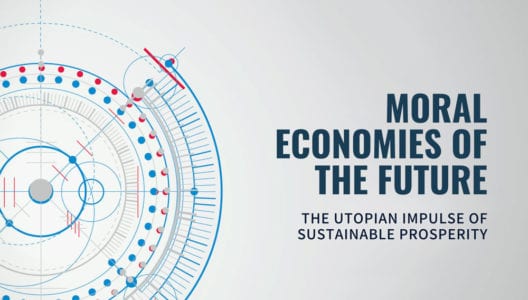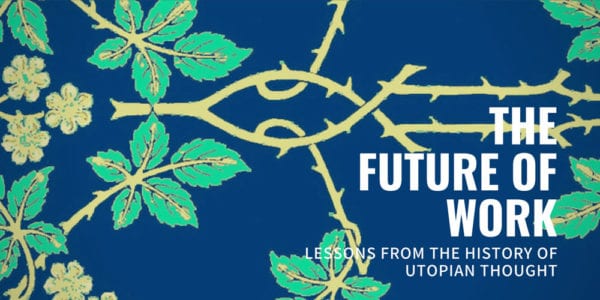This is not all there is: Thinking utopias as ideas and practices
‘Utopias’ is one of the cross-cutting themes in CUSP, spanning our various research programmes. In this blog, Will Davies is reflecting on what the concept of utopia can offer in terms of its prefigurative potential, and how it is informing our interdisciplinary research.

The idea of ‘utopia’ has resurfaced in recent years, prompted by various cultural, political and economic developments. One of these must surely be the phenomenon of what anthropologist David Graeber has termed ‘despair fatigue’, whereby the apparently endless present of neoliberal austerity eventually triggers the eruption of alternative visions, almost out of sheer psychological necessity. Another has been the recognition that new technologies could liberate humanity from work, drudgery and competition, if only they were seized and applied differently, as books such as Inventing the Future have argued. Then there was the five hundredth anniversary of Thomas More’s Utopia a couple of years ago, which prompted fresh attention to the concept.
This concept has become relevant to CUSP via a number of paths. It is central to two of the essays we published last year on the meaning of sustainable prosperity: Ruth Levitas’s ‘Where there is no vision, the people perish’ and John Bellamy Foster’s ‘The meaning of work in a sustainable society’, and was discussed at the launch event for the essay series in February 2018. My working paper, ‘Moral Economies of the Future’, drew on theories of utopia, expectation and fiction to examine how moral-economic commitments extend into the distant future. And the recently published Economic Science Fictions, to which Tim Jackson and I contributed, developed some of this thinking further, to consider how literary and speculative imagination can be employed to understand and criticise the present.
But the concept also cuts across CUSP’s work in many more, often surprising ways, whether or not it is named as such. Influenced especially by Levitas’s work on utopia as a ‘method’ and by Erik Olin Wright’s work on ‘real utopias’, various researchers within CUSP are exploring the role of imagination, hope, fiction, enclaves, performance, eschatology and modelling as productive and transformative forces within contemporary society. This is one of several cross-cutting themes within our work, which we recently met to explore further. To make sense of that very wide-ranging conversation, I suggest we can think of utopias as figuring in CUSP work in two related ways: as ‘idea’ and as ‘practice’.
Utopia clearly begins as an idea, in the sense that the term refers to a place that doesn’t exist. But as Levitas’s work stresses, it is an idea that may play a powerful role in all emancipatory and transformative politics, or even in the human condition. To have an idea of utopia is to recognise that something is lacking, and to imagine alternatives. But how exactly does a ‘utopia’ differs from adjacent concepts, such as ‘aspiration’, ‘progress’, ‘a better future’, ‘growth’ and so on? And does it offer anything valuable?
In some sense, modernity involves the collapse of political hope into ‘progress’. Meanwhile, individualistic market societies collapse progress into ‘aspiration’. When these political and economic goals stop working, or start to become destructive (as with the idea of indefinite economic growth, as explored in Richard Douglas’s doctoral research), then perhaps that opens up opportunities to understand what vision of a good life might arrive instead. In some ways the naivete of utopian thinking might be politically energising – but on the other, it might add to the disappointment with the present, or collapse back into a form of nostalgia for an imagined community of the past. As ideals of progress, growth and aspiration stop functioning, it becomes an empirical question as to how people gauge their idea of a good life and a good society, as our research into social and psychological understandings of sustainable prosperity is exploring. We must not assume that images of a better economy or life are necessarily comforting or empowering, and they can also create deep feelings of regret or self-recrimination that things didn’t turn out differently.
That then raises questions as to how utopian thinking might be liberating, rather than disempowering or psychologically oppressive. That can only be achieved if some consideration is given to what autonomy actually means, especially with regards to working life. One answer is provided by libertarian utopianism, which pushes individual emancipation in dangerous directions, where freedom means the ability to escape, retreat and avoid the fate that awaits the rest of society. The enclaves that seduce billionaire libertarians, such as sea-steading, island retreats, and inter-planetary travel, are utopian for their beneficiaries but dystopian for everyone else.
A more socially responsible political task is to map an idea of freedom that is compatible with ethical duties and fulfilling work, as Bellamy Foster’s essay points towards. This may involve nostalgic ideals of past solidarities, but also needs to engage with the expanding possibilities of automation today. To avoid a purely introspective utopianism, or a libertarian dream of escape, Wright’s notion of ‘real utopias’ becomes important, in inspiring the types of institutions that might offer viable forms of security and solidarity in the 21st century. This brings us to the second way in which ‘utopia’ is at play here: as practice.
In some ways, utopian practice is all around us, in the expectations and plans we hold for future events (or what Jens Beckert describes as the ‘fictional expectations’ of the economy). Pessimistically, from CUSP’s perspective, this can involve people diverting hope towards wholly private, self-destructive and unsustainable forms of activity, which give up on any prospect of real societal change (much as Andreas Malm’s recent and brilliant polemic against postmodernism, reviewed here, has argued). Advertising employs utopias, rooted in feelings of lack, potentially even of personal inadequacy.
So what would it mean to construct ‘fictional expectations’ that gave hope instead? As Tim Jackson pointed out at one of our meetings, economic modelling is a type of utopian practice, inasmuch as it gives form to an imagined future, and can be used to explore alternatives. Targets and goals aim to represent a more desirable future in some way, although there is a balance to be struck between the ideal (and hence ‘unrealistic’) target and the realistic but potentially punitive one. This poses the question of exactly how much realism we want from our indicators and targets.
Beyond these acts of representation there is a practical and political question (perhaps the political question) of how plans, designs and ideals can mobilise people to act differently, and in concert with one another. A number of CUSP researchers are interested in the idea of ‘prefigurative’ practices, that is of how a vision can be given experimental form, with a view to later becoming expanded or normalised. The System Dynamics work strand and our research into the political and organisational dimensions of prosperity both pay close attention to this question. The question of how an ideal is first shared, then gradually converted into a plan, and how that plan then becomes accepted and followed, is one that concerns social entrepreneurs and activists. How prefigurative experiments then scale up and spread is a whole other social and political problem altogether.
This is a problem with quite mundane, practical characteristics. It concerns how to subtly alter activity, how to perform and normalise democratic engagement in decision-making, and how to change people’s affective dispositions so as to see their own future differently. Theatre and the arts can play a role, as the Arts and Culture theme of research partly examines. Exaggerating the scale of transformations may be counter-productive, in contrast to staging everyday practices that give hope. The idea that this is not all there is, and that something else will one day arrive, is arguably a fact of being human that should not be overlooked, even in otherwise prosaic acts of social renewal and change.






